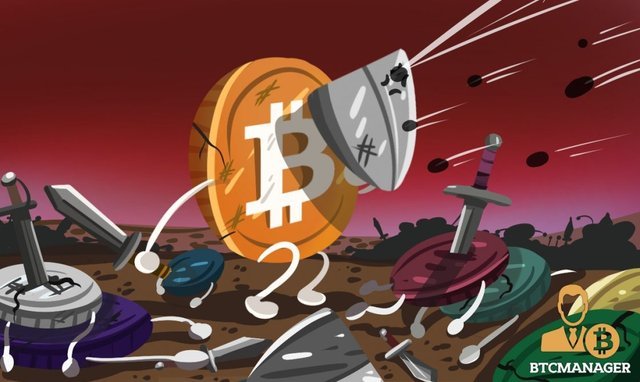
- Many people call Bitcoin a store of value.
- Many call it Gold 2.0
- Many think it is the only legitimate currency.
- Many think it is competition with this or that.
- Many people think that deflation creates value.
- "Environmentalists" will say it wastes energy.
- Central banks tell us it's for pedophiles and drug dealers.
Yeah... Bitcoin is none of these things.
And at the risk of beating a dead horse, I'm going to focus on the fact that Bitcoin is not a store of value. It is a network that generates value at exponential speeds. The entire concept of storing value is that one could buy gold 200 years ago that would have bought them a nice suit at the time, but 200 years later that same gold can still buy a nice suit. It is only a hedge against currency devaluation, not something that can generate value or evolve into something greater. Gold will always be gold.
Bitcoin is obviously not that.
Because it is exponentially better than that, doubling in value every year. And even though it is a UNICORN asset doubling in value every year, people STILL try to make the argument that it isn't safe because it is often correlated to the market for temporary timespans. When the market is down and Bitcoin is down people try to call it unsafe because it 'lost value', which is obviously totally absurdist garbage with the insight of a five year old child who just learned something new.
No matter how old we get it seems that many of us revert back to those childish ways and never seem to learn or advance. Perhaps one day we will be able to address this problem. Until then it's a competition and it benefits us when others are stupid within the zero-sum games we create.

Everything about Bitcoin points to security.
- Expending energy to create money (mining) is all about security.
- This mitigates double spend attacks.
- It is not "wasting energy"
- The codebase being upgrade slowly (or not at all) is secure.
- Adding code adds attack vectors.
- The lack of a governance structure is secure.
- The lack of inflation is secure.
The lack of inflation is secure.
Truly, this is the crux of the issue. Many people wrongfully assume that the artificial scarcity provided by "21M coins" is the thing that builds value. Artificial scarcity has never and will never build value. Ever... ever. Artificial scarcity can only CAPTURE value, not build it.
When a corporation corners a market and then chokes the supply of an asset so they can jack up the price... that is not creating value. That is capturing value. Read this post to learn the difference, as the difference is pretty damn important.
Thus, the fact that Bitcoin employs this strategy has nothing to do with "creating" or "storing" value, but rather the logarithmic token cap of "21M Bitcoin", along with many other variables, all ties back into that store of security. Having no inflation makes the network secure, because allocating inflation to a place that leeches more value than it generates is an attack vector.
Bitcoin eliminates all attack vectors.
And we'll notice that no cryptocurrency in existence has EVER tried to compete with that. No cryptocurrency in existence never thought, "Hey, a 10 minute blocktime is good, but what about 20 or 30 minutes... or even an hour!" Because indeed, if you make the blocktime longer and pump more energy and hashrate into it, it will become more secure. But nobody does it, because Bitcoin has the monopoly on security, so no one even tries to compete with that small niche.
Security is boring anyway.
Imagine stepping onto a boat and being fascinated with the anchor. Wow, this anchor is great. This anchor is the future of all boating activities. Kids on the boat would look at you like the boomer that you are. The anchor is boring as hell. Who cares about security when all this other stuff up and running and way more exciting than the stupid anchor?

The anchor stops you from getting swept away.
The only time we care about security is when shit hits the fan and crypto comes under attack. In crypto, all attacks are liquidity/volatility based. Prices go down: people panic. Doesn't matter why the price went down. Could be regulators or a bubble caused by whales or a hack or whatever else. Stability and security are things people only start to care about when they've been flung off the boat and hanging onto an innertube for dear life.
No smart contracts
Not a lot of smart-contracts on BTC. To be fair, they do exist, but again they are super raw and basic and expensive. At the end of the day Bitcoin is all about transferring money from point A to point B as securely as possible. That is the niche, and that is the value proposition. It has NOTHING to do with deflation or gold 2.0 or whatever else. The 21M supply is just a tiny subset of the greater security variable that seeks to eliminate all attack vectors.
Still don't believe me?
Artificial scarcity captures value, not creates it. This is a fact. So if Bitcoin is using artificial scarcity to capture value, who is it capturing value for? Certainly not anyone in particular; Not even the network in general. At best the artificial scarcity of Bitcoin benefits users that got in before other users, and the value from the new users is transferred to the old users.
If you can't tell already what I'm implying... the artificial scarcity of Bitcoin actually has NEGATIVE EV (estimated value). The deflation of Bitcoin is actually hurting the network and stifling growth, because value is transferred from new users to old users. New users who realize what is happening will never want to join in the first place (or will ragequit after a pump/dump like they always do).
Thus, transferring value from new to old users is a net loss to the network as a whole. Even though it is capturing value for the old users, it does so by creating a huge opportunity cost in future gains and growth.
The ONLY reason Bitcoin employs deflation is not because this creates value, but because it is SECURE. If inflation was allocated in another way (take Hive for example) then there would be an added attack vector that allowed random users to allocate inflation in whatever way they saw fit. Rather than allowing that potential attack vector to exist, Bitcoin eliminates this potential threat entirely, even though it's possible it's missing out on free value generation. But again this is fine because all that risk is outsourced to altcoins in a cooperative open-source ecosystem.
Risk vs Reward.
Bitcoin has the best risk vs reward than any other asset on the planet. That's because Bitcoin takes zero risks and still manages to somehow achieve a doubling effect every year on average. Sure, other cryptos that take more risk are bound to randomly go 10x or even 100x or 1000x, but the risks involved on these protocols is not something you would want for the first coin who's primary purpose is to simply STAY ALIVE AT ALL COSTS.

Conclusion
I hope my readers can see now what the value proposition is of Bitcoin. When I first entered the space in 2017 I didn't like Bitcoin. It was boring. It was going to get flipped by better tech eventually. I'd rather find that better tech.
But I was deceived.
The research I did on Bitcoin led me to believe it was something that it was not. I was told it was a store of value. It was not. If Bitcoin was a store of value, then nothing about it is any different that any other cryptocurrency that builds value.
Rather Bitcoin is a store of security, and not only does it have the monopoly on security, no other crypto is even attempting to compete with that monopoly, and rightfully so. There is simply no reason to try to compete when there are infinitely more fun and interesting things to do than worry about getting flung off the boat. Let Bitcoin handle that. Onward and upward.
Now I realize that having Bitcoin is an absolute necessity for long-term security. To many it will seem redundant and boring, and it is. That's what crypto is all about: redundant and inefficient protocols that sacrifice efficiency for trust. The Bitcoin network is a very trustworthy source; Perhaps the most trustworthy source in the entire world.
Whenever anyone asks me what they should invest in... I always just tell them Bitcoin. If anyone doesn't know where they should be putting their money, they should obviously putting their money into the safest thing until they figure it out and start participating in the communities we are building. Not not financial advice.
Posted Using LeoFinance Beta

